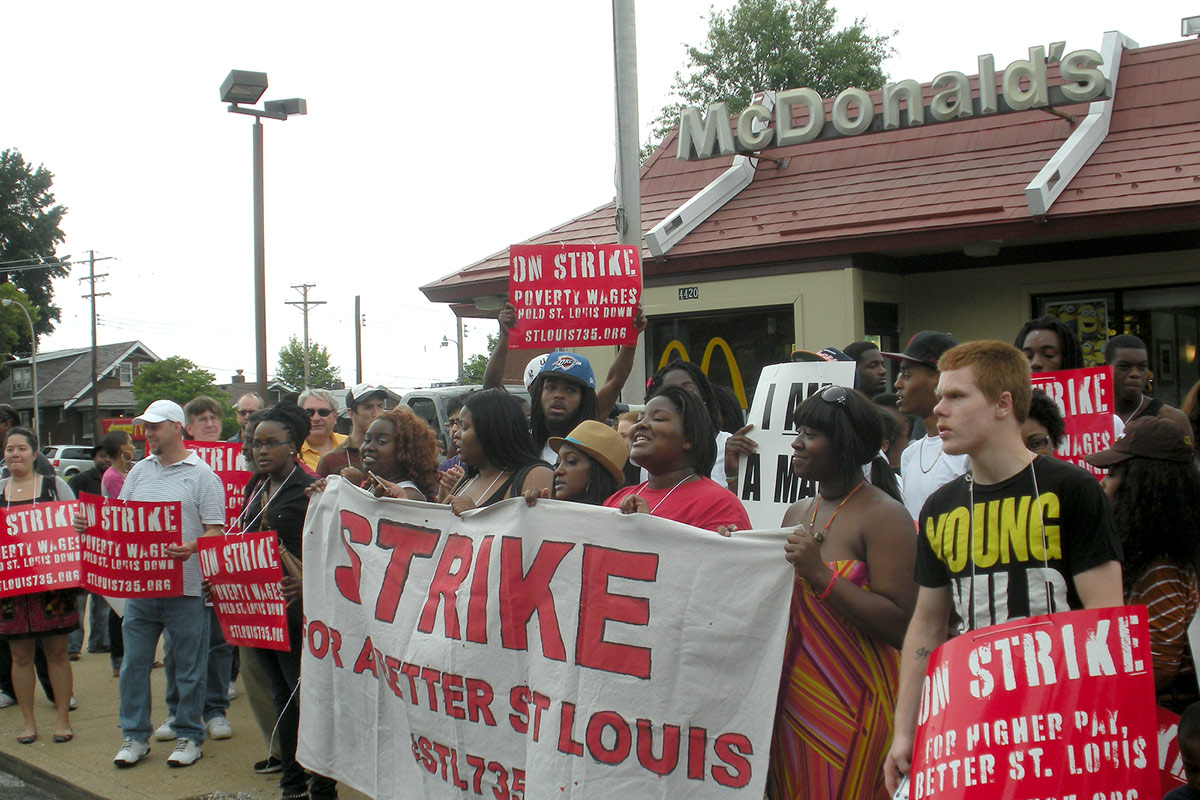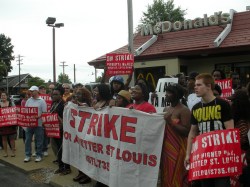Fast food workers are striking. That’s not a sentence I thought I’d ever write. While the strike “movement” dates back to November, a wave of walkouts this week has upped the ante considerably. In November it was New York City. Recent actions have taken place in Chicago, Washington, D.C., St. Louis, Kansas City, and Detroit at chains including McDonald’s, Taco Bell, Popeyes, and Long John Silver’s.
The main demand: higher wages of up to $15 per hour.
Many fast food workers earn close to the federal minimum wage of $7.25 per hour — below a living wage for the cities in which most of these workers live — and what strike organizers refer to as “poverty wages.”
Restaurant owners respond that most of their minimum wage workers are young and don’t stay on the job for very long – and therefore, they don’t require higher wages. The companies are trying to play up the stereotype of the McJob as a transitional step to bigger and better things. But anyone who has ever set foot in a fast food restaurant knows that it’s not filled with budding entrepreneurs/musicians/artists waiting to move up the ladder.
In fact, Twilight Greenaway, writing for Civil Eats, didn’t have to dig deep to contradict the restaurant owners’ rosy vision of their workplace. She spoke to several long-suffering fast food workers, including 57-year-old(!) Morris Cornley:
Cornley returned from Iraq a few years ago and got hired driving trucks. Then, when he was laid off two years ago, a fast food job was all he could find. He now works 32-40 hours a week, but is considered a part-time employee, even on weeks when his hours exceed 40. “I feel like the American Dream is slipping by,” he says.
As an African-American, Cornley suggests another way of slicing the demographics: As one labor organizer pointed out, most workers involved with this week’s work stoppages are minorities. It’s a window into the growing wealth gap between whites and minorities.
Given all this, it’s fair to ask whether these companies could truly afford to raise wages. After all, they’re selling lowest-common-denominator food at bargain-basement prices.
Of course they could.
Henry Blodget, editor-in-chief of Business Insider, pointed out that McDonald’s could increase its minimum wage to $15 per hour and still make decent money, if less than its current $8.5 billion annual operating profit. Blodget also points out that much of the downward wage pressure on workers of all stripes is a result of the decades-long executive mantra of “profit maximization,” itself an outgrowth of the “shareholder rights” movement, which put the needs of Wall Street investors far ahead of the needs of working people.* It’s one of several trends feeding rising income inequality, which really is as bad as people are saying.
Another option for these companies would be to simply raise prices. McDonald’s could bump up a Big Mac above its current $3.99, not to mention all the items on its Dollar Menu. (Note to internet: That oft-cited claim that doubling workers’ wages would only require increasing the price of a Big Mac by $0.68: Wrong!)
But it’s hard to call the “Dollar Menu” the Dollar Menu when its contents cost a buck 17. And you can’t raise the price of a Big Mac just a little! It’s $3.99 for a reason. I imagine that sticking to these “magic prices” is as much of a concern for McDonald’s as anything else. And in an era of rising meat costs, it should make you wonder what the company has had to do to its “burgers” to maintain that dollar price point. *Shudder*
But there might be a solution to this problem that would be a win-win — for consumers and for workers, that is; I’m frankly not too worried about McDonald’s CEO Donald Thompson, who made $13.8 million last year.
Why not raise wages by cutting portion sizes? What’s not to like? Put more into fast food workers’ pockets and take a bite out of obesity, since there’s compelling evidence that reducing portion size does decrease overall caloric intake.
But if I climb down off of my cloud and admit that probably won’t happen, then what will? Are these strikes achieving anything?
Reading the food-industry trade publications, you might think that these walkouts will do nothing less than usher in the apocalypse — or at least iPad ordering systems that would eliminate the need for a few low-paid humans. (Don’t say they didn’t warn you!)
This being America, the land of union busting and the lost middle class, we probably won’t see the massive unionization of fast food outlets. Although the recent protests were funded by the Service Employees International Union, fast food workers tend to be the hardest to organize, according to several experts quoted in The New York Times and elsewhere — mostly because of fast food restaurants’ astronomical annual turnover rate: 75 percent. Companies might want you to believe it’s because of all those budding entrepreneurs leaving. Probably not. Seriously.
And it’s unlikely we’ll see a $15-per-hour minimum wage. While these events add momentum to Obama’s push to increase the federal minimum wage to $9 per hour, House and Senate Republicans remain immovable.
Likelier would be an increase in pressure for broad living-wage laws in cities around the country. There are several currently on the books in various cities, but many only cover city contractors or taxpayer-supported projects — Philadelphia and New York City both have such ordinances. Washington, D.C., just passed one that covers “big box” store workers — part of the District’s long battle with Walmart.
These ordinances don’t cover fast food workers, but it’s easy to imagine protections for fast food workers becoming a big issue in New York, if nowhere else, what with a pornorgraphic contentious mayoral race in full swing. And as goes New York, well, maybe we’ll all get there eventually.
We can hope so. Workers in general could use a win, but especially food workers, who are often forced to work even when they’re sick, which seems like a really bad idea.
If fast food workers win this fight, or at least advance their cause, it opens the door to other low-wage workers realizing that their numbers, which have grown so overwhelmingly great in the slow-growth aftermath of the Great Recession, are indeed a source of power.
* Anyone else note the irony that the most successful rights movement of the last 50 years was one carried out by Wall Street investors?




